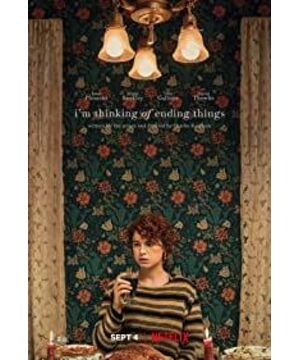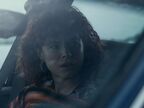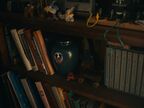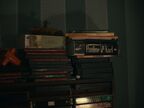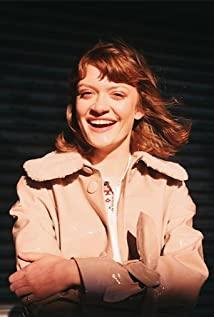In September, I watched one of my favorite movies of the year, "I'm Thinking of Ending Things" (I'm Thinking of Ending Things). It belongs to the kind that is not very amazing at first sight, but after that, I can't stop thinking about it until I watch it a second time and I am impressed by it. It belongs to the kind of movie that "must" be watched a second time, because when you watch it a second time with the information you get after watching it the first time, the true interest of the movie will be revealed little by little.
For me, one of the important indicators for judging whether a movie is good or bad is the "lingering rhyme". After the movie is over, the thoughts continue to ferment and brew, hours, days, months, even years, such as "Twin Peaks". There are also differences between the afterglow. Some of the afterglow is achieved by using our brain's hobby for logic. After the movie is over, we are still hooked by suspense, entangled in the truth, repeatedly chewing on the details and trying to assemble the pieces. Many great suspense films can be used as good ones. example.
There is also a kind of aftertaste that slowly evaporates. It is sometimes strong, sometimes weak, and looming, but no matter which fragment emerges at the moment, it is worth pondering carefully. "Truth" is not the most important thing here, even if several conflicting "truths" are obtained at the same time, it does not matter. Like Jiang Wen's "The Sun Also Rises" or "One Step Away", like this film, and of course "Twin Peaks".
However, before pushing the expectations of this film too high, it must be explained that it is a typical "big stuffy film". In the film, there are often large sections of dense dialogue in the same space, and there are claustrophobic interiors in the car. With super-long paragraphs in space, and surreal and weird scenes, this film is not popular. If you want to watch the movie by yourself, please stop here, because next I will sort out the shorthand of the ghosts when watching the movie, a lot of spoilers, be careful!
From a structural point of view, the film can be clearly divided into four paragraphs: the first 20 minutes, the hero and heroine Jake and Lucy drive to Jake's parents' house, the entire paragraph is completely the dialogue between the two people in the car, interspersed with the life of an old school worker and the work scene; the next 50 minutes was a "magical" experience at Jake's parents' house, Lucy met Jake's parents of all ages, old, middle and young; the third segment was in the "return" car after leaving Jake's parents' house for more than 30 minutes In the dialogue, a paragraph about getting out of the car to buy ice cream is inserted in the middle, and then Jake insists on going around his alma mater to have a look; the ending paragraph of the last 20 minutes takes place in the school building of Jake's alma mater. Since in the end we will know that the only so-called "real person" in the film is the old school worker, whose name should be Jake, and the whole film can be seen as a (again) "exercise" in his mind ". In the film, the hero Jake is the self-image in his mind, representing most of his character traits, knowledge, interests, and a little idealized modification. The heroine Lucy is more like his ideal partner (companion), But at the same time it can also be considered the embodiment of some idealized self of him. Jake's parents in the film are a collection of all the memory fragments he remembers about his parents, so it makes sense for Lucy to see the weird scenes of Jake's parents of all ages, because the whole film only happens in the school worker Jake's The memory impressions of someone in our minds, and we have them in our minds, are just so disorganized. When rewatching the film with this understanding, we can interpret the four paragraphs as follows: The first paragraph is the dialogue in the car, which is the self-thinking and self-debate of the old school workers, whether people want to live because of fun or just a set procedure ; In the second paragraph, the old school worker met the parents in the memory, and through the created Lucy as a "third party" role, he re-examined his relationship with his parents, and finally reached some kind of reconciliation with his parents; the third paragraph once again Dialogue in the car, the old school worker once again thought deeply and deeply about himself, as a group of people who are not seen in the society, how to understand the value of self-life; the last paragraph is an interweaving of reality, imagination and illusion In the paragraph, the old school worker officially bid farewell to the partner personality Lucy he created. After countless repeated "rehearsal" and speculation in his mind, this time the old school worker finally let go of his mediocre and mediocre life. He took his own life in the car. The first paragraph discusses self-identity, the second paragraph discusses the relationship between the individual and parents, which is also a matter of reproduction, and the third paragraph discusses the relationship between the individual and society, It was also a community issue, and the fourth paragraph reached a settlement, proposing some sort of non-religious solution in the face of "mortal death." In the following, I will try some scenes in each of the four large paragraphs for a more detailed analysis.
In the first paragraph in the car, they talked about poetry and musicals, and admired the gloomy beauty of the scenery outside the window like a portrait of his pale and barren life. Jake and Lucy finally talk about a topic, Lucy thinks that everything wants to live, but Jake disagrees. They debated for a while, arguing with each other, and the atmosphere became a bit awkward. This is a conclusion of the old school worker's self-reflection: If everything in the world wants to live, why would he want to end everything? Jake and Lucy had their own reasons, and neither could convince the other, and at this moment, they "suddenly" arrived at the door of Jake's parents' house, and the discussion stopped there. This "sudden arrival" method will appear many times in the future. It vividly reflects our way of thinking. Once the thinking gets stuck, the brain will switch its attention to another thing. After "arriving", Jake did not lead Lucy into the house immediately, but took her to the farmhouse next to her. This unreasonable action can be understood as thinking again about the unfinished problem just now. In the farmhouse, Jake talks about sheep that have been locked together in a stinky life, frozen in the snow if they die, and waited for spring to be handled by someone, which foreshadows his own end. He also talked about one of his childhood shadows - the pig that was eaten alive by maggots. This pig is an important image that runs through the whole book. It is a portrayal of the old school worker's life being devoured by the mundane and trivial life. In the end, it is also used to symbolize the achievement of final reconciliation.
The second paragraph is in the parents' house, the four of them are sitting around for dinner. During the conversation, it can be seen that Jake's parents are typical "countrymen" who have little knowledge but are inexplicably certain of their own opinions. "Youth" Jake creates a clear contrast and even conflict. And although their husband and wife can't help but quarrel, but their son Jake is always full of love. When reading this paragraph, we must remember that Jake and Lucy are actually the same person, and this paragraph should be understood as a three-person scene where children face their parents. It's just that there are a lot of things that need to be re-said by Lucy's mouth, and there are many things that need to be re-looked through Lucy's eyes. Lucy showed his father his paintings (it was explained in the back of the movie that it was actually the work of the 19th-century American landscape painter Blakelock), the father made a lot of ridiculous comments, and the mother would only blindly encourage it to smooth things out. It is conceivable that this The scene may have actually happened. This is the memory of the parents in their prime and the young Jake. The two sides gradually opened up in terms of cultural level and knowledge, and they were incomprehensible and difficult to communicate with each other. And this time, because of Lucy, Jake gets a slightly more objective perspective. Whether they understand you or not, they're great parents because they love you, which is the most important thing about being a parent, Lucy told Jake. The chat between the four of them in the living room after the meal is the memory of the elderly parents and the prime-age Jake. Through the mouth of Lucy who studies "gerontology", he said: Our current society is too unfriendly to the elderly. This is a kind of review by the janitor on his own living state who has entered old age, and because of this, he can give more understanding and tolerance to the parents in old age. There's also an interesting scene in this passage where Lucy feeds Jake a big cake made by his mother. It looks like a gesture of intimacy made by ordinary couples, and at the same time it is also a metaphor. With the help of Lucy as an intermediary, Jake completes the reconciliation of the mother-son relationship. In the room on the second floor, there are memories of parents and middle-aged Jake who are in the final stage of life. Jake finally chose to stay with his parents and took care of them until their old age, at the cost of staying in the school as a janitor and doing nothing for a lifetime. This is the point he can't let go of the most. He can't confirm the value of this choice. He may have resented his parents for it. He can't even confirm whether this choice is because of his parents or just because of his cowardice and passivity. But Lucy told him, "I admire your care for your mother. Few people can do that. I see (your dedication and sacrifice)." This is janitor Jake borrowed"
In the same snowy interior space, the third paragraph became more and more gloomy. Jake's description of the mentality of the elderly living in an alienated society is exactly the description of his state of mind at the moment: physical decline, ignorance of others, embarrassment of missed opportunities, regret of once possible, mediocrity in mediocrity The resentment at the end of my life for all the inspirational quotes I've ever heard. In the third paragraph, the "Taxi Town Ice Cream Shop" under the snowy night is a wonderful scene. The two blond waitresses, who looked like they came out of a Lynch movie, ignored Lucy's order in front of them, but mocked and teased Jake, who was huddled aside. Lift, this should be Jake's state of facing the opposite sex all the time. At this time, a black-haired waitress came out of the store with her head lowered again, with the same cramped expression, and silently started to make ice cream for them. We recognize that she is also Jake by the same red rash on her hands as Jake's. What she represents is the group of those who are despised and excluded from the classmates, colleagues, and all groups, and those who Jake said in the car seem to carry a "black halo" and are not seen by society. marginalized people.
Back in the car, they couldn't eat the two ice cream buckets before they took two bites, why? Because in the last paragraph Jake just ate the big cake that his mother made. In the later section of the school building we will see a huge trash can full of empty ice cream cups, indicating that Jake has eaten countless ice creams in his mind, but this time he did not eat it, which means that some changes are happening. The school building in the fourth paragraph is a multiple image, it is not only the place where the old school worker Jake lives and works, but also Jake's spiritual belonging in this mental journey. After some psychological struggle, Lucy entered the school building and met the old school worker. Lucy said my boyfriend got lost here and I came looking for him...I'm a little worried about him. The old school worker said, don't worry, it's safe here, it's quiet here. So where is "here"? , I think is his heart. After rounds of deliberation and repeated memories, Jake reconciled with himself and his parents, and he no longer needs to be "seen" through Lucy's eyes, so here, he and Lucy formally bid farewell. There are almost no lines in this segment, and the two actors only rely on body language and facial micro-expressions to push their emotions to the top, which is amazing.
The ending scene is a car covered in heavy snow. It's winter vacation, and the old school workers will be like sheep frozen to death in the farmhouse, waiting until next spring to be discovered and dealt with.
A school clerk who looks like a transparent man in a small town middle school. He may also be a person who loves musicals, painting, movies, philosophy, and has a wide range of interests in quantum physics, neuroscience, sociology, and a very rich spiritual world. people. There are many possibilities in his life, physicist, painter, film critic, etc. However, he did not like the protagonist in the inspirational story to go all the way to the top of his life, but gradually made a decision one after another. Sliding to the edge of society, it is about to end a mediocre life like this.
But the question the film asks us is, isn't this life worth living?
Camus said that suicide is the only serious philosophical issue. I like that this film uses a light presentation method to discuss all the "important" issues such as the meaning of life, the value of life, the relationship between people and family, and society. , and even delicately set the suspense and put on the coat of "psychological thriller", which really makes it easy to lift weights.
Just from the ending, the movie finally came to a rather vain conclusion - there are successful people in this world, and there are always people who live like pigs that are eaten away. It just so happens that that person is you, as long as the perspective is microscopic enough , everything in the world is the same. But if you watch the movie carefully, you will find that the whole process of arriving at this empty conclusion contains love and warmth, life interest, and the light of life. What is the so-called success and failure in the secular sense compared to the splendor and richness of life itself?
View more about I'm Thinking of Ending Things reviews


